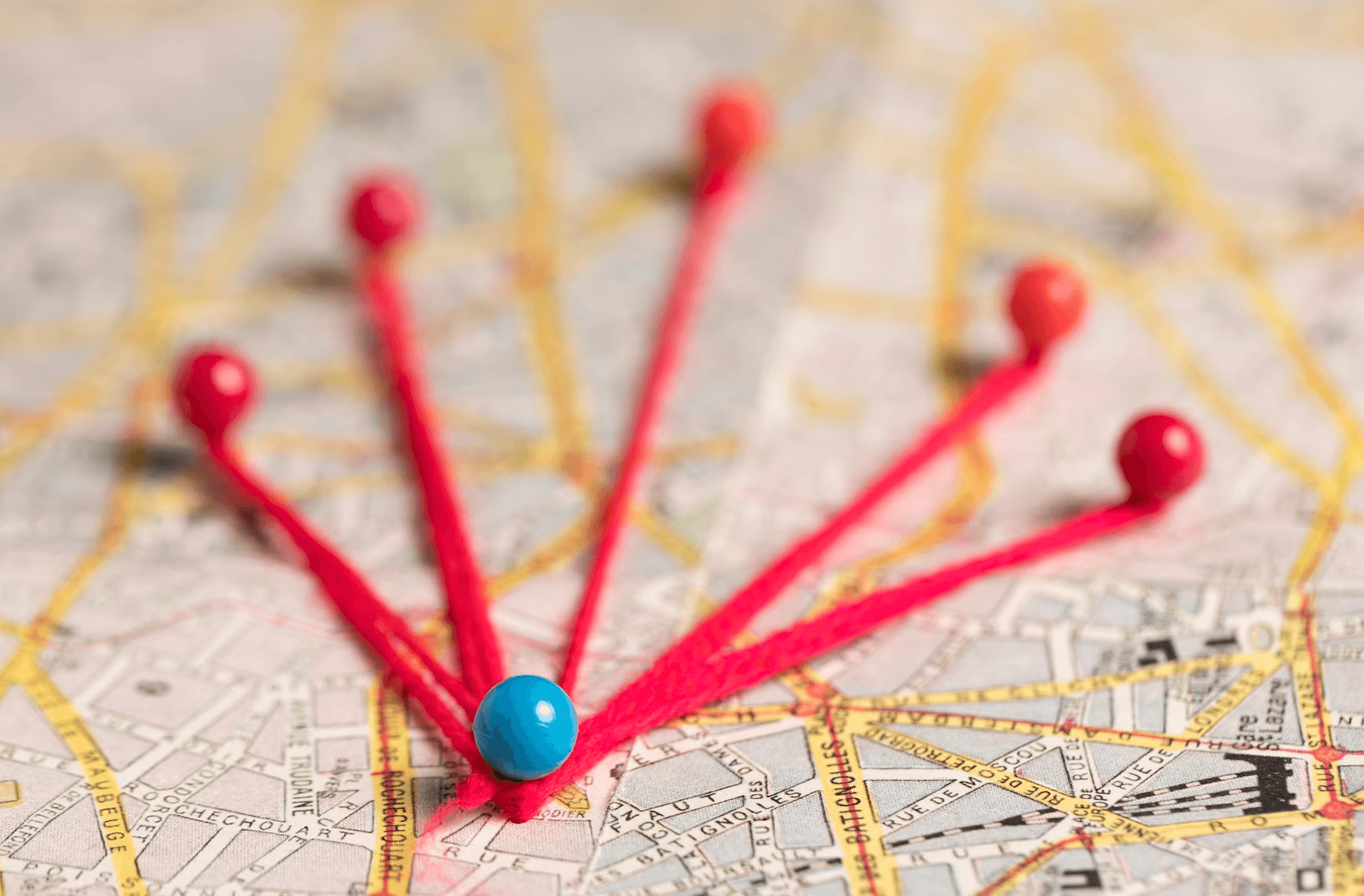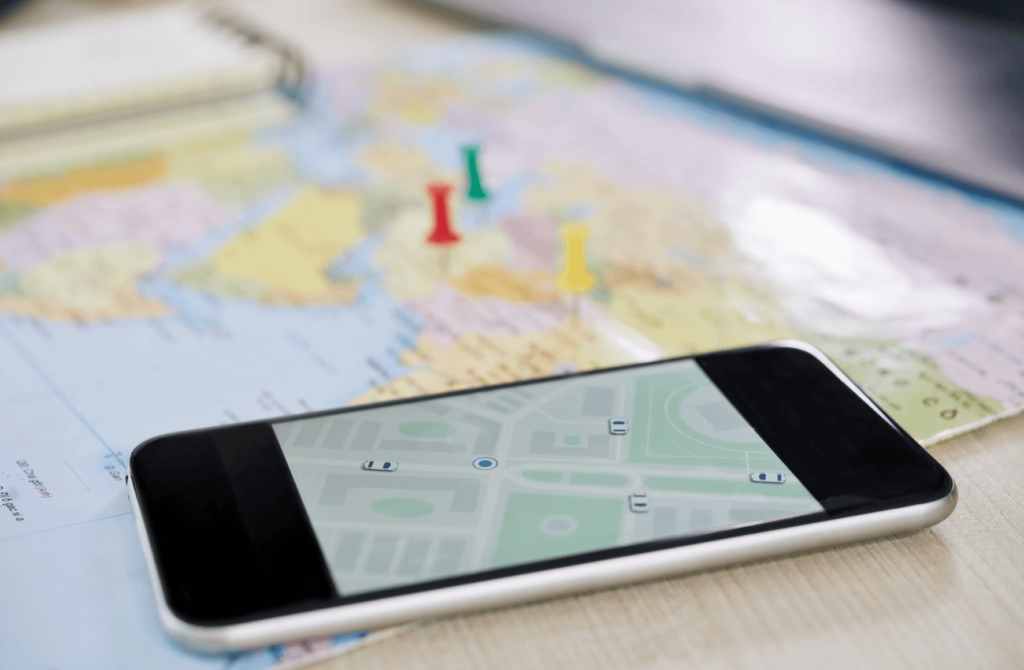Geolocation System in Business: Best Use Cases!

Geolocation is a powerful technology that can be used to enhance various aspects of business management. By selecting the right geolocation system to meet its needs, a company can benefit from a multitude of advantages. We explain it all in this article.
- What is a geolocation system?
- Different types of location tracking
- Pros and cons of geolocation systems
- Geolocation system: security and privacy
- How do geolocation systems work?
What is a geolocation system?
A geolocation system allows for the precise determination of the geographic location of an object, person, or vehicle. This technology, which has evolved significantly over the years, offers numerous practical and essential applications for businesses seeking efficiency and security.

What are the different types of location tracking?
- GPS Geolocation
GPS is the most commonly used geolocation system worldwide. It relies on a network of satellites in Earth’s orbit that emit precise signals to determine the position of a GPS receiver. It’s the technology of choice for automotive navigation, mapping, smartphone geolocation, and many other applications.
- Cell Tower Geolocation
Mobile phone antennas can be used to determine the position of a cell phone based on the cell it’s connected to. This method is often employed for emergency location services and mobile phone tracking. It’s very useful for lone workers.
Protecting your lone workers should be your top priority.
They should feel safe at all times.
- Geolocation via RFID (Radio-Frequency Identification)
RFID tags emit radio signals to track the location of objects to which they are attached. This technology is commonly used in supply chain management, asset tracking, and inventory management.
- Geolocation through Geofencing
Geofencing allows for the creation of virtual boundaries on a map, triggering actions when devices enter or exit these zones. This technology is widely used for fleet management.
Pros and Cons of Geolocation Systems
Advantages of Geolocation Systems
- Location Precision
Geolocation systems provide impressive accuracy in determining the position of an object, person, or vehicle. This precision is crucial for many applications, especially in navigation, logistics, and security.
- Logistics Optimization
Companies can optimize their logistics operations by tracking the real-time position of their vehicles and goods. This helps reduce costs, improve efficiency, and better satisfy customers.
- Personal Safety
Geolocation systems can be vital for personal safety, allowing the tracking of individuals in danger, such as lone workers (salespeople, laborers, etc.).
- Asset Tracking
Companies can monitor their assets, whether vehicles, freight containers, or expensive equipment, to prevent theft and optimize their utilization.
Disadvantages of Geolocation Systems
- Privacy Concerns
One of the main disadvantages of geolocation systems is the growing concern about privacy protection. Constant location tracking can be perceived as an intrusion into individuals’ private lives.
- Technology Dependency
Geolocation systems have become so integrated into our lives that we are increasingly dependent on them. In case of a breakdown or malfunction, this can lead to significant inconveniences.
- High Costs
Implementing and maintaining geolocation systems can represent a significant investment for businesses. The costs associated with technology, subscriptions, and staff training need to be considered.
- Data Security
Collecting and storing location data can raise security issues, especially concerning vulnerability to hacking and privacy breaches.
- Potential for Misuse
Like any technology, geolocation systems can be used for malicious purposes, including harassment, illegal surveillance, and identity theft.
For enhanced security, you should be accompanied by experts in the field.
Geolocation System: Security and Privacy
- Fundamentals of Security
When it comes to geolocation systems, security should be a paramount concern. These systems collect and transmit real-time location data, which raises concerns about the vulnerability of this information to malicious actors. It is essential to establish robust security protocols to ensure that geolocation data remains confidential and does not fall into the wrong hands.
- Encryption and Authentication
One of the key security measures in a geolocation system is the use of data encryption. Location data must be encrypted during collection, transfer, and storage to prevent interception by unauthorized third parties. Additionally, users must be securely authenticated to ensure that only authorized individuals have access to geolocation information.
- Consent and Control
Privacy protection is a major concern for users of geolocation systems. It is imperative that companies using these technologies obtain informed consent from their users before collecting their location data. Furthermore, users must have full control over access to their geolocation information, including the ability to disable it at any time.
- Secure Data Storage
Another aspect of security in geolocation systems is data storage. Geolocation information must be securely stored, using advanced protection measures such as data redundancy, regular backups, and intrusion detection. This ensures that even in the event of a security breach, the data remains protected.

How do geolocation systems work?
Geolocation systems are valuable tools that accurately determine the geographical position of an object, person, or vehicle. Their operation relies on an intelligent combination of several components and technologies:
- GPS Satellites: The central pillar of geolocation is the Global Positioning System (GPS), a network of satellites orbiting the Earth. These satellites emit radio signals that GPS receivers capture.
- Triangulation: When a GPS receiver receives signals from multiple satellites, it performs a triangulation calculation. By measuring the time it takes for the signals to travel from the satellite to the receiver, it can determine the distance between the receiver and each satellite. By combining these distances, it calculates its own geographical position with high accuracy.
- Differential Corrections: To increase geolocation accuracy, some systems use differential corrections. These corrections include information about possible errors in GPS signals, such as atmospheric refraction. By using this data, GPS receivers can refine their positioning, especially in environments where precision is crucial, such as aviation and precision agriculture.
- Cellular Networks: In addition to GPS, geolocation systems can also utilize cellular networks. Mobile phone towers can determine the position of a cell phone based on the signals it emits. This method is particularly useful in cases of weak GPS signals or in dense urban areas.
- Additional Sensors: Some geolocation systems incorporate other sensors like accelerometers, gyroscopes, and magnetometers to enhance location accuracy and stability, especially in the presence of obstacles or disrupted GPS signals.
